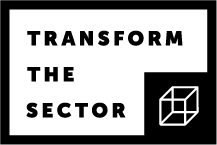It’s been a month since #sectortransform17, but here at Powered by Data we are still feeling energized by seeing 300 people from government, foundations, and nonprofits come together with international and Canadian experts to discuss how digital data can move their work forward. Having that many people talking about digital data in the same space was a first for the Canadian social sector.
Throughout the day, we consistently heard the need for more — more discussions, more gatherings like Transform the Sector, and more knowledge sharing. We heard you loud and clear. As a first step, we are working to take the great conversations that happened at Transform the Sector and turn them into useful resources. You can sign up to be a reviewer of those materials here and provide your feedback before their publication.
Either way, stay tuned for further updates. In the meantime, here is our list of the 5 themes that we heard emerge throughout the day:
1) The importance of doing data ethically
As Lucy Bernholz made clear in her keynote speech, we need to build a digital civil society that reflects our values. That means ensuring that data collection and storage is done in a way that respects the people it is being collected from, and ensures that already vulnerable people are not being put at greater risk.
2) Administrative Data is the new cool kid in town
There is a new cool kid in town and their name is administrative data. We heard how administrative data can help the social sector better evaluate its impact. What we found even more exciting was that we heard — from Tris Lumley at New Philanthropy Capital in the UK and Canada’s Robyn Blackadar at PolicyWise — about projects that are using administrative data already. Given the success of these existing projects, it’s clear there are opportunities to scale up the use of administrative data in Canada.
3) Data will continue to impact the relationship between civil society and government
A lot of thought has gone into how nonprofits can maintain their independence from funders but it is important to be reminded that the increased use of data will likely continue to push the sector towards a more integrated model. The way the sector chooses to handle this transformation will impact the extent to which that happens. The sector could mitigate this loss of independence, but only if it recognizes this trend and develops alternative models.
4) The social sector needs to increase its data capacity now
While panelists and participants pointed to the work done by the Mowat Center and by ONN as early initiatives highlighting the importance of the sector learning how to benefit from data, that need became increasingly apparent throughout the day. The signal to build that capacity is reinforced both by the surprising demand for the conference — which resulted in us doubling the number of seats — and our early analysis of the post conference survey responses. Nearly 60% of respondents said that they specifically needed help “increasing the social sector's (or my sub-sector's) ability to use data”. Given the high demand, it’s not clear we can wait for policymakers, funders, or habitual leaders to help us build this capacity.
5) The data transformation is already underway
A new mix of organizations has emerged as leaders doing this work already. They were showcased in the Lightning round, as well as sessions like Collecting Data for Collective Impact and Beyond Dollars: How Funders are opening their Data for Impact. They included relative newcomers such as the First Nations Information Governance Centre, the Calgary Homeless Foundation, and PolicyWise as well as more established organizations like the Canadian Council for Social Development, CanadaHelps, and the YMCA of Greater Toronto.
We want to hear from you
What important idea or theme did you hear emerge during the day? Did we miss anything? Did you hear it differently? What data issues do you think the sector should focus on? You can add your comments below or share them on social media using #sectortransform17.


